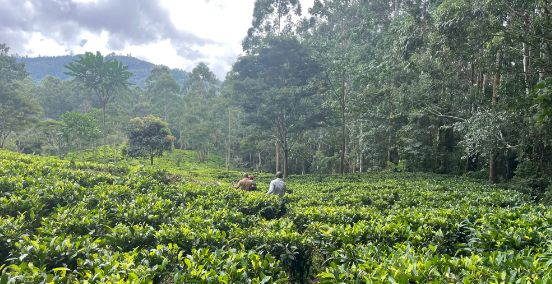
Discover the Environmental Impact of Tea and How Tea Rebellion is Making a Difference
Welcome to the world of tea
Welcome to the world of tea, where your favourite brew not only soothes your senses but also carries an environmental footprint. In this exploration, we delve into the ecological impact of tea production and consumption. From sprawling plantations to your teacup, each step leaves a mark on the planet. It's in this context that Tea Rebellion is redefining the tea industry by prioritising sustainability, ethical sourcing, and environmental stewardship. Join us as we uncover the journey of tea from farm to cup, the challenges it poses to our planet, and the innovative solutions we propose for a regenerative future
Environmental Impact of Tea Production
Water Consumption and Pollution in Tea Cultivation
Tea cultivation requires a significant amount of water, and the industry is often associated with water pollution due to the runoff of pesticides and fertilisers into water sources. This can lead to contamination of water bodies, affecting aquatic life and human health.
Deforestation for Tea Plantations and Biodiversity Loss
The expansion of tea plantations often leads to deforestation, resulting in the loss of natural habitats for various plant and animal species. This can disrupt local ecosystems, leading to a decline in biodiversity.
Usage of Pesticides and Chemicals in Tea Farming
To protect tea crops from pests and diseases, farmers often use pesticides and chemicals. However, the overuse and improper disposal of these substances can have harmful effects on the environment, including soil degradation and water contamination.
Many certification standards have strict use on either eliminating them altogether or restricting them to a certain period in the growing cycle.
Carbon Emissions Throughout the Tea Supply Chain
From cultivation to processing and transportation, the tea supply chain contributes to carbon emissions. Factors such as machinery usage, energy consumption, and transportation methods all play a role in the carbon footprint of tea production. To mitigate these emissions, sustainable practices and eco-friendly alternatives are being increasingly adopted in the tea industry.
In addition to the direct environmental impacts mentioned above, tea production also has indirect effects on ecosystems and communities. The introduction of monoculture plantations can disrupt the balance of local flora and fauna, leading to a loss of biodiversity. Furthermore, the use of agrochemicals can seep into the soil and affect not only the immediate plantation area but also surrounding lands and water sources.
Moreover, the social implications of tea production cannot be ignored. In many tea-producing regions, labour practices, including wages and working conditions, may not meet international standards. This can lead to exploitation of workers and negatively impact local communities.
As consumer awareness of environmental and social issues grows, there is a rising demand for ethically sourced and sustainable teas. Certification schemes such as Fairtrade and Rainforest Alliance aim to address these concerns by promoting fair wages, sustainable farming practices, and environmental conservation. However for many of us these standards are not high enough.
To truly minimise the environmental impact of tea production, a holistic approach is needed. This involves not only addressing water consumption, deforestation, pesticide use, and carbon emission, treatment of workers and preservation of local ecosystems but also enhancing soil fertility and biodiversity -this is what our regenerative tea farming practices are all about.
Tea Rebellion: Championing Sustainability and Ethical Practices
Tea Rebellion, a trailblazer in the tea industry, stands out for its unwavering commitment to sustainability and acceleration of regenerative tea farming. By prioritising direct trade, fostering strong relationships with partner farmers, and launching the Regenerative Tea Action Project, Tea Rebellion champions a cause beyond producing exceptional tea.
Ethos of Sustainability and Social Responsibility
The Tea Rebellion's ethos revolves around the core principles of sustainability, social responsibility, and community empowerment. The B Corp certification serves as a testament to their social and environmental responsibility, setting a high standard for transparency and ethical conduct in the industry.Through their direct trade practices, they ensure that farmers receive fair compensation for their hard work, enabling them to invest in sustainable farming methods and improve their livelihoods. By forging strong partnerships with tea-growing communities, Tea Rebellion not only sources high-quality tea but also contributes to the economic development and well-being of these regions.
Leading by Example in Ethical Business Practices
In a competitive industry where sustainability is increasingly vital, Tea Rebellion serves as a beacon of ethical business practices and responsible sourcing. By choosing Tea Rebellion, consumers not only savour exceptional teas but also contribute to a more sustainable and equitable tea industry. Through their multifaceted approach to sustainability, Tea Rebellion inspires positive change and sets a precedent for ethical entrepreneurship in the tea sector. Tea Rebellion's dedication to sustainability and ethical practices not only benefits the environment and local communities but also resonates with consumers who seek products that align with their values. By promoting transparency in their operations and highlighting the stories of local producers, Tea Rebellion fosters a sense of connection between consumers and the origins of their tea. This transparency not only builds trust but also educates consumers about the importance of supporting ethical brands that prioritise sustainability. The impact of Tea Rebellion's initiatives extends beyond the tea industry, influencing other businesses to adopt similar ethical practices and driving positive change on a larger scale. As consumers become more conscious of the social and environmental impact of their purchases, companies like Tea Rebellion play a crucial role in shaping a more sustainable future for the tea industry and beyond.
Revolutionising the Tea Industry
Impact of Consumer Choices on Sustainability
Consumer choices have emerged as a powerful force driving sustainability within the tea industry. The shift towards ethically sourced tea leaves, support for Fairtrade practices, and a preference for organic blends are all influencing the way tea is produced and traded. This growing demand for sustainable options is not only reshaping the market but also encouraging tea producers to adopt more environmentally friendly and socially responsible practices.
Influence of Sustainable Practices on Environmental Health
The tea industry's embrace of sustainable practices is proving to be a boon for environmental health. By reducing pesticide use, transitioning to organic farming methods, and implementing water conservation techniques, tea producers are safeguarding the delicate ecosystems in which tea is grown. These initiatives not only protect biodiversity but also contribute to mitigating climate change and preserving natural resources for future generations.
Catalysing Positive Change Across the Tea Sector
Driving positive change across the tea sector necessitates a collaborative approach involving all stakeholders. From tea farmers and producers to retailers and consumers, everyone has a role to play in fostering sustainability and ethical practices. Initiatives such as reforestation projects, ensuring fair wages and working conditions for tea workers, and supporting community development schemes are vital steps towards creating a more equitable, environmentally conscious tea industry.
Sustainable Packaging Solutions
In addition to sustainable farming practices, the tea industry is increasingly focusing on sustainable packaging solutions. As consumer awareness about plastic pollution and waste management grows, there is a growing demand for eco-friendly packaging materials. Tea companies are exploring biodegradable packaging options, innovative compostable materials, and recyclable packaging to reduce their environmental impact. By choosing sustainable packaging solutions, tea producers can further enhance their commitment to environmental stewardship and meet the evolving preferences of eco-conscious consumers.
Educating Consumers on Sustainability
Educating consumers about the environmental and social impact of their tea choices is crucial for driving meaningful change. Tea companies are investing in educational campaigns to raise awareness about sustainable farming practices, fair trade certifications, and the importance of supporting ethical tea production. By empowering consumers with information, tea brands can inspire conscious purchasing decisions and encourage a shift towards a more sustainable tea industry.
Collaborative Partnerships for Sustainability
Collaboration among tea industry stakeholders is essential for achieving widespread sustainability goals. Partnerships between tea producers, non-profit organisations, government agencies, and research institutions can facilitate knowledge sharing, funding opportunities, and collective initiatives to address sustainability challenges. By working together towards common objectives, the tea sector can amplify its impact, drive innovation, and foster a culture of sustainability that benefits both people and the planet.
Looking Ahead: The Future of Sustainable Tea
As the tea industry continues to evolve, the future of sustainable tea holds great promise. By prioritising sustainability, embracing innovation, and engaging consumers in the journey towards ethical production, the tea sector can set new standards for environmental responsibility and social impact. From supporting smallholder tea farmers to promoting biodiversity conservation, the possibilities for positive change are endless. Through collective action and a shared commitment to sustainability, the tea industry is poised to revolutionise itself into a beacon of ethical excellence and environmental stewardship.
The Future of Tea: Sustaining Our Planet
The significance of sustainable practices in every industry cannot be overstated. The tea industry, with its deep-rooted traditions and global popularity, is also undergoing a transformation towards a more eco-conscious approach. Let's explore the key aspects shaping the future of tea production and its crucial role in sustaining our planet for generations to come.
Harnessing Emerging Trends for Sustainable Tea Production
As the awareness of environmental issues grows, so does the demand for sustainably sourced products, including tea. The emergence of trends like regenerative agriculture, agroforestry, and carbon-neutral practices is reshaping the way tea is cultivated. By embracing these innovative methods, tea producers can minimise their environmental impact and promote biodiversity, ensuring a healthier ecosystem for both plants and wildlife.
The Rise of Organic and Fair Trade Tea
In response to growing consumer awareness and demand for ethically sourced products, organic and fair trade teas are gaining momentum in the market. Organic tea cultivation eliminates the use of synthetic pesticides and fertilisers, promoting soil health and biodiversity. Fair trade practices ensure that tea workers receive fair wages and operate in safe working conditions, empowering communities in tea-producing regions. Regenerative tea farming is the next step in this evolution and one that Tea Rebellion fosters.
Environmental Challenges and Solutions in Tea Production
Despite the progress towards sustainability, the tea industry faces challenges such as water scarcity, deforestation, and waste management. To address these issues, innovative solutions like regenerative farming practices, rainwater harvesting, reforestation projects, and recycling initiatives are being implemented across tea plantations. These sustainable practices not only mitigate environmental risks but also contribute to the long-term resilience and viability of tea production and our global carbon and biodiversity goals.
Conclusion
The tea industry has a significant environmental impact, ranging from deforestation to excessive water usage. However, organisations like Tea Rebellion and others in the Regenerative Tea Action Project and beyond are promoting sustainable and ethical practices within the tea supply chain. By prioritising transparency, fair wages, and action on organic and regenerative farming, Tea Rebellion is leading by example.
